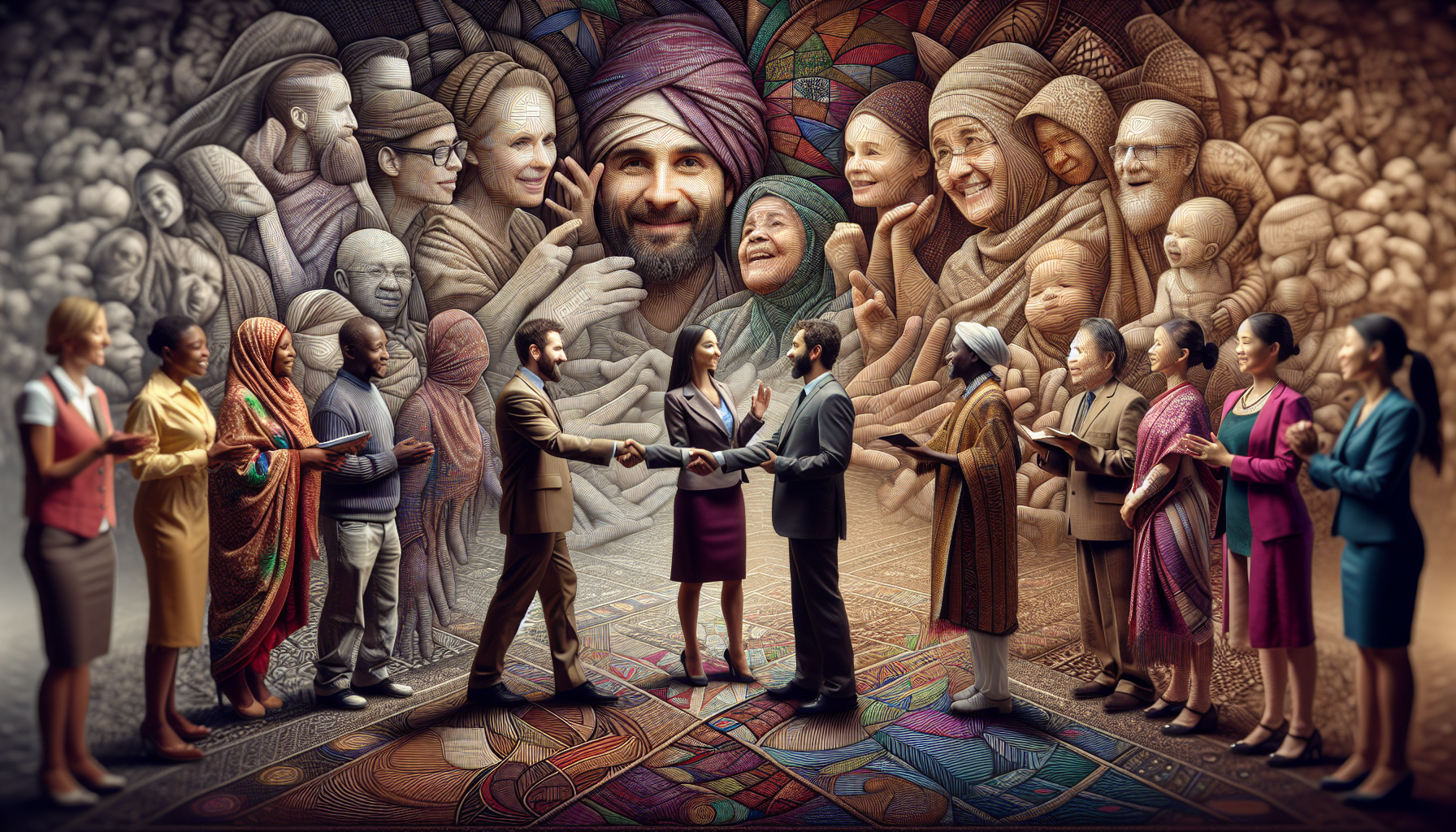Embracing cultural sensitivity while traveling is not just about being a polite tourist; it’s about becoming a conscientious global citizen who appreciates and respects the diversity of our world. This course is designed to guide travelers on how to honor local customs and traditions, navigate the complexities of cultural engagement, and leave a positive impact on the communities they visit. From understanding the basics of cultural sensitivity, through meticulous preparation for your journey, to practicing respectful engagement and immersion, this course offers invaluable insights into transforming your travel experiences into meaningful, enriching adventures.
Lesson 1

Understanding Cultural Sensitivity in Travel
When we embark on journeys across the globe, it’s crucial to recognize the value of cultural sensitivity. Cultural sensitivity isn’t just a nice-to-have; it’s a must-have for anyone looking to explore the world respectfully. This concept forms the backbone of any travel experience, ensuring that we not only observe but also appreciate and respect the customs and traditions of the places we visit.
What is Cultural Sensitivity?
Cultural sensitivity involves being aware that cultural differences and similarities exist and have an effect on values, learning, and behavior. Recognizing these differences allows travelers to interact more harmoniously with locals, creating enriching experiences for both parties. Moreover, it guides us in avoiding behaviors that could be considered disrespectful or offensive in different cultural contexts.
The Importance of Respecting Local Customs and Traditions
Respecting local customs and traditions underscores the essence of cultural sensitivity. When travelers make a conscious effort to respect a community’s way of life, it fosters mutual understanding and respect. This approach can transform a simple visit into a truly immersive experience, where both the traveler and the host community learn from each other.
The Impact of Cultural Insensitivity on Communities and Travelers
Cultural insensitivity can lead to misunderstandings, discomfort, and even conflict. For communities, it can feel like an intrusion or disregard for their way of life. For travelers, it might result in a less welcoming experience. Hence, recognizing and practicing cultural sensitivity not only enhances personal travel experiences but also contributes positively to the communities visited.
Strategies for Cultivating Cultural Sensitivity
Building cultural sensitivity requires effort and intentionality. Below are some strategies that can help travelers become more culturally sensitive:
- Conduct thorough research: Before traveling, take time to learn about your destination’s cultural practices and norms.
- Observe and listen: Pay attention to local customs and traditions by observing and listening to the people you encounter.
- Ask questions respectfully: If unsure about a cultural practice, politely ask a local or your guide for clarification.
- Be open and adaptable: Embrace new experiences and be willing to adjust your behavior to respect local customs.
By incorporating these strategies into your travel preparations, you’re not only set to enjoy a more authentic and respectful journey but also to leave a positive impact on the places you visit. Remember, cultural sensitivity in travel is about building bridges, not walls. It’s about coming together and celebrating the diverse tapestry that makes up our world.
Lesson 2

Mastering Research and Preparation for Cultural Engagement
Before setting foot in a new destination, the sheer excitement can be exhilarating. Yet, it’s crucial to understand that every adventure requires a solid foundation of research and preparation, especially when it comes to respecting and embracing local cultures. Navigating through the maze of customs and traditions might seem daunting, but with the right approach, you can transform it into a rewarding part of your travel experience.
Delving Into Local Customs and Traditions
Understanding local customs and traditions is the first step towards a culturally rich travel experience. But where do you begin? The digital age has made information more accessible than ever. Use online resources, travel blogs, cultural forums, and official tourism websites to gather essential insights about your destination. It’s not just about what to do; understanding what not to do is equally important. This knowledge can shape your interaction with locals, ensuring it’s both respectful and meaningful.
Embracing Cultural Dos and Don’ts
Every culture has its unique set of unwritten rules — the dos and don’ts that govern social etiquette. Maybe it’s customary to remove your shoes before entering a home in Japan, or perhaps offering a firm handshake is a sign of disrespect in some cultures. These nuances might seem minor, but they’re significant to the people who observe them daily. Respecting these practices shows your willingness to embrace the local culture genuinely.
Packing with Purpose and Respect
Packing for your journey is not just about what you’ll wear; it’s also an opportunity to show respect for local customs. Research appropriate attire, especially if you plan to visit religious sites or attend cultural events. Modest clothing might be required in some places, while others might have specific dress codes. This consideration not only prepares you for a seamless experience but also demonstrates cultural sensitivity.
Critical Tips for In-Depth Cultural Research
- Start your research early: Give yourself ample time to understand the cultural intricacies of your destination.
- Engage with multimedia resources: Documentaries, films, and music can provide deeper insights into the local culture.
- Connect with locals online: Social media and travel forums can be great platforms to ask questions and get tips from residents.
- Learn basic language phrases: Knowing how to say hello, thank you, and sorry in the local language can go a long way.
By dedicating time to research and prepare before your travels, you’re not only equipping yourself with the knowledge to navigate cultural complexities; you’re also opening the door to a more authentic and enriching travel experience. Remember, the goal is not just to see the world but to appreciate the incredible cultural diversity it offers.
Lesson 3

Enhancing Your Travel Through Cultural Immersion and Respect
Enriching your travel experience goes beyond just visiting new places; it’s about immersively connecting with the local culture and practices. By engaging respectfully with the community and traditions, travelers can forge meaningful relationships, gain profound insights, and leave a positive footprint. Understanding how to respectfully immerse oneself in new cultures is not just beneficial—it’s essential for any traveler seeking an authentic experience.
Communicating Respectfully with Locals
Effective communication is key to demonstrating respect and openness when interacting with local communities. It starts with the basics: learning a few phrases in the local language. This simple gesture can go a long way in showing your respect and eagerness to connect. Moreover, non-verbal communication—such as gestures, facial expressions, and body language—plays a crucial role in bridging language barriers. Being mindful of these nuances can enhance your interactions, making them more positive and enriching.
Joining in Local Traditions and Customs
One of the most rewarding aspects of travel is the opportunity to participate in local customs and traditions. Whether attending a cultural ceremony, trying traditional cuisine, or wearing locally customary attire for specific occasions, these experiences allow you to see the world through a new lens. However, it’s crucial to approach these opportunities with sensitivity and openness, ensuring that your participation is welcomed and appropriate.
Navigating Cultural Mishaps Gracefully
Even with the best intentions, cultural misunderstandings can occur. When they do, the ability to handle them gracefully is invaluable. Apologize sincerely if you inadvertently offend someone and take it as a learning opportunity. Most locals are understanding and appreciative when they see genuine respect and effort from visitors trying to engage with their culture.
Leaving a Positive Impact
Traveling with cultural sensitivity doesn’t just enhance your experience; it can also positively impact the communities you visit. One way to do this is by supporting local economies—opt for local businesses, artisans, and guides. Furthermore, be mindful of your environmental footprint and strive to respect and preserve cultural sites and natural environments. Your actions, no matter how small, contribute to a larger picture of mutual respect and understanding.
By adopting these practices, your journey becomes more than just a series of destinations; it transforms into a rich tapestry of authentic encounters and shared humanity. Remember, at the heart of travel is the profound opportunity to connect, learn, and grow. And by approaching each experience with respect and openness, you’re not just a visitor—you’re a global citizen, contributing to the beautiful mosaic of our interconnected world.







